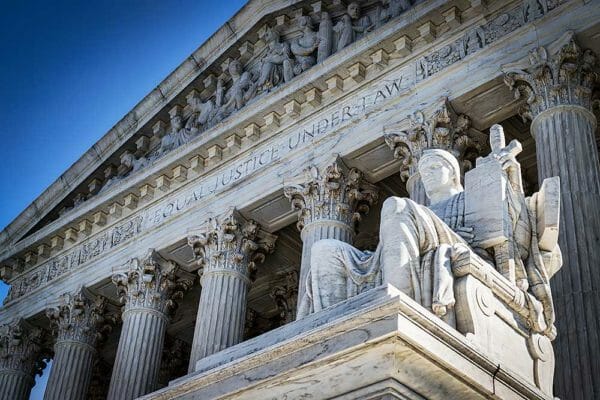
U.S.A. –-(AmmoLand.com)- The Supreme Court held that the so-called “community caretaking” exception to the Fourth Amendment, which allows certain warrantless searches of vehicles, does not extend to the home. Earlier this year, Firearms Policy Coalition (FPC), Firearms Policy Foundation (FPF), and Independence Institute filed a brief in support of the petitioner, authored by Joseph Greenlee, FPC’s Director of Constitutional Studies, that extensively detailed the history behind the Constitution’s protections against home searches, arguing that “American resistance to home invasions ultimately led to the American Revolution” and that “extending the community caretaking exception to the home would undermine the constitutional text, the founders’ intent, and centuries of tradition.” The opinion in Caniglia v. Strom can be found at FPCLegal.org.
Noting that the Court previously “recognized a few permissible invasions of the home and its curtilage,” the Court’s unanimous opinion, authored by Justice Clarence Thomas, vacated and remanded last year’s opinion from the First Circuit, noting that the lower court went “beyond anything this Court has recognized,” and that “[w]hat is reasonable for vehicles is different from what is reasonable for homes.”
In a concurring opinion, Justice Alito mentioned that today’s opinion does not address “red flag” laws that “enable the police to seize guns pursuant to a court order to prevent their use for suicide or the infliction of harm on innocent persons.” The justice also noted that “[p]rovisions of red flag laws may be challenged under the Fourth Amendment, and those cases may come before us.” FPC has supported litigation against “red flag” orders and will continue to raise challenges against such unconstitutional laws.
“Today’s opinion acknowledges something that America’s Constitution and founders were already quite clear about—that the People should be free from unreasonable search and seizure, and that the sanctity of the home is central to American freedom,” explained Adam Kraut, FPC’s Senior Director of Legal Operations. “As our brief made clear, these so-called ‘community caretaking’ searches of homes and seizures of firearms are based on the flimsiest of standards, without any historical support. They violate the text of the Constitution and its original public meaning, and are nothing less than a blatant violation of the Fourth Amendment. We are delighted that the Court affirmed that truth in today’s unanimous decision.”
Individuals that are interested in joining FPC in the fight against tyranny can become a member of the FPC Grassroots Army for just $25 at JoinFPC.org.
Firearms Policy Coalition and its FPC Law team are the nation’s next-generation advocates leading the Second Amendment litigation and research space. Some FPC legal actions include:
- A brief supporting certiorari in NYSRPA v. Bruen, which was granted by the U.S. Supreme Court
- A challenge to Tennessee’s ban on handgun carry by adults under 21 (Basset v. Slatery)
- A challenge to Maryland’s ban on handgun carry (Call v. Jones)
- A challenge to New Jersey’s ban on handgun carry (Bennett v. Davis)
- A challenge to New York City’s ban on handgun carry (Greco v. New York City)
- A challenge to Pennsylvania’s ban on handgun carry by adults under 21 (Lara v. Evanchick)
- A challenge to the federal ban on the sale of handguns and handgun ammunition to adults under 21 years of age (Reese v. ATF)
- A challenge to Maryland’s ban on so-called “assault weapons” (Bianchi v. Frosh)
- Challenge to California’s ban on so-called “assault weapons” (Miller v. Calif. Att’y General)
- A challenge to California’s handgun “roster”, microstamping, and self-manufacturing ban laws (Renna v. Bonta)
- A challenge to Pennsylvania’s laws completely denying the right to carry to individuals who were previously granted relief from prior non-violent convictions and are not currently prohibited from possessing firearms (Suarez v. Evanchick)
For more on these cases and other legal action initiatives, visit FPCLegal.org and follow FPC on Instagram, Twitter, Facebook, YouTube.
About Firearms Policy Coalition
Firearms Policy Coalition (firearmspolicy.org), a 501(c)4 nonprofit organization, exists to create a world of maximal human liberty, defend constitutional rights, advance individual liberty, and restore freedom. FPC’s efforts are focused on the Right to Keep and Bear Arms and adjacent issues including freedom of speech, due process, unlawful searches and seizures, separation of powers, asset forfeitures, privacy, encryption, and limited government. The FPC team are next-generation advocates working to achieve the Organization’s strategic objectives through litigation, research, scholarly publications, amicus briefing, legislative and regulatory action, grassroots activism, education, outreach, and other programs. FPC Law (FPCLaw.org), the nation’s largest public interest legal team focused on the Right to Keep and Bear Arms, lead the Second Amendment litigation and research space.


At least FPC has a list of what they are trying to work on, that is more than the NRA shows, the NRA seems to jump in to claim victory after some other organization has fought to get it!!!!!!!!!!
The so-called “caretaking exception” itself is a violation of both the 4th Amendment and the bright line between Equity (civil law) and Law (criminal law). Much of our loss of fundamental rights is directly attributable to the encroachment of Equity upon our fundamental rights where it has no lawful authority. The only rights available at Equity are those established by contract, and one of the most important rulings we could ever obtain from SCOTUS would be a ruling abolishing the rule, promulgated some time in the 1930’s by the Roosevelt-packed SCOTUS, combining the rules of equity and law into one… Read more »
My understanding is that legal distinction is made as to whether motor home has been placed in stationary use. I know that stationary includes being hooked to utilities, think it hasn’t to be jacked up for stability, may even need wheels removed.
To me it is clear that if you are parked it is a home. While traveling down the road it is a hybrid. In either case occupants’ rights should be afforded the same respect as someone in a stationary house.